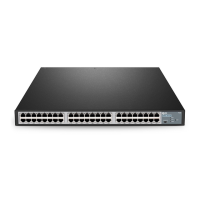- 1 -
Chapter 1 Setting Loopback Detection
1.1 Intro of Loopback Detection
The loopback in a network may trigger the repeated transmission of broadcast,
multicast or unicast packets, wasting network resources and even leaving network
breakdown. To avoid the above-mentioned troubles, it is necessary to provide a
detection mechanism to promptly notify users of detecting network connection and
configuration at the occurrence of loopback and to take troubled ports under control.
Loopback detection can check whether loopback happens on a port of a to-be-tested
device by transmitting a detection packet from this port and checking whether this
packet can be received still on this port. When the device finds that loopback exists on
its port, it can transmit alarm promptly to the network management system for
administrators to detect network problems in time; thus, long time of network
disconnection can be prevented. Moreover, loopback detection is capable of having
ports under control. You can opt for port block, port MAC-learning forbidding or
error-disable according to actual requirements to make corresponding ports under
control and lessen the loopback's network influence to the minimum level.
MY COMPANY switches support loopback detection in the following aspects:
Supporting to set loopback detection on the port
Supporting to set the destination MAC address for loopback detection packets
Supporting to conduct loopback detection to at most 10 specified ports
Supporting to set the transmission interval of loopback detection packets and the
recovery time of controlled port
Supporting to control port, including port block, port MAC-learn forbidding, and
error-disable
Supporting to set whether loopback exists on a port by default
1.1.1 Format of Loopback Detection Packet
Field
Length/Byte
Value
DMAC 6
0x0180C2B0000A (default value,
configurable )
SMAC 6
MAC address of the switch
www.fs.com
S5500-48T8SP LOOPBACK D
ETECTION CONFIGURATION GUIDE

